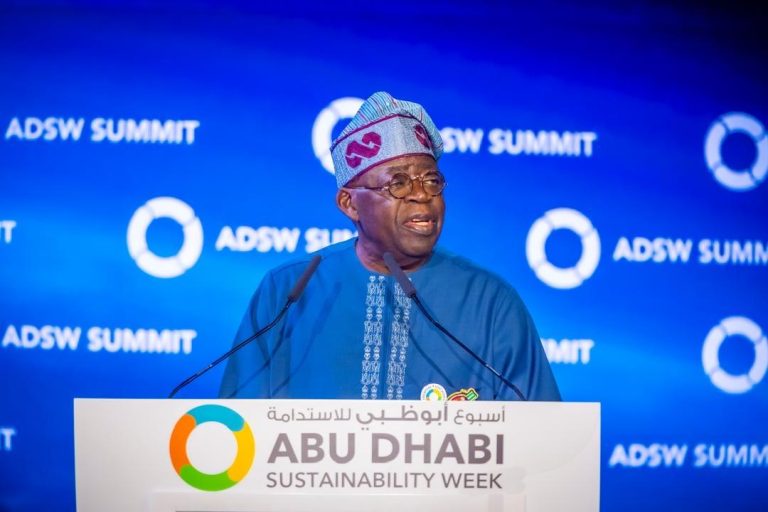President Bola Tinubu on Wednesday, reassured a global audience of Nigeria’s commitment to partnering with other nations to create a resilient, equitable, and sustainable world.
Speaking on the second day of the 2025 Abu Dhabi Sustainability Week, during a session titled “From Climate Imperatives into Economic Prosperity: Bridging Africa with the Global Energy Future,” Tinubu emphasized the importance of collective action in tackling global sustainability challenges.
“The fight against climate change is not merely an environmental necessity but a global economic opportunity to reshape the trajectory of our continent and the global energy landscape,” he stated.
He underscored the need for innovation and collaboration to meet the demands of the moment:
“As leaders, stakeholders, and citizens of our planet, we stand at a critical juncture in human history. To succeed, we must innovate, collaborate, and act decisively as one global community.”
Reiterating Nigeria’s commitment to reducing carbon emissions, Tinubu outlined his administration’s strategic framework, anchored on three pillars: Energy Transition, Climate Resilience, and Sustainable Development.
“We have embraced a vision of sustainability that aligns with global aspirations while addressing local realities. Our energy transition plans aim to diversify energy sources and reduce dependency on fossil fuels, prioritizing cleaner energy sources as a cornerstone of our national development strategy,” he said.
The President highlighted Nigeria’s efforts to promote clean and renewable energy, including developing infrastructure for the widespread use of compressed natural gas (CNG) and electric vehicles, as well as harnessing the potential of solid minerals to support a green energy transition.
Tinubu also spoke about Nigeria’s adoption of climate-smart agricultural practices to enhance food security while minimizing environmental impact. He referenced the introduction of the National Clean Cooking Policy, aimed at promoting clean energy, environmental health, and socio-economic development across the African region.
He stressed the need for local and international collaboration to mitigate the effects of environmental challenges such as deforestation, desertification, coastal erosion, flooding, and pollution, which threaten millions of livelihoods.
“To promote a Green Economy in Africa, we must integrate sustainable practices across all sectors of our economy. These investments are capital-intensive and require international support from partner countries, multinational organizations, development partners, and individuals who share our vision of a sustainable, prosperous, and equitable future,” Tinubu explained.
The President highlighted Nigeria’s pioneering role in Africa as the first country to fund green projects through Sovereign Green Bond proceeds, with the third issuance underway. He called on investors to collaborate with Nigeria:
“Our administration remains committed to providing an enabling environment for businesses to thrive. By partnering with global leaders and harnessing the power of technology, we are finding new and innovative ways to address our environmental challenges.”
Tinubu also pointed to Nigeria’s potential for advanced technological farming and the use of Artificial Intelligence to enhance agricultural productivity.
President Tinubu concluded by commending UAE President Mohamed bin Zayed Al Nahyan for his foresight in organizing the event, which brought global leaders together to address pressing sustainability challenges.
He called on the global community to join forces in mobilizing resources, fostering innovation, and embracing technology to combat climate change and promote sustainable development.


